This is the story of a female gynecologist, rural women and pervasive cervical cancer in a remote, obscure town nestled in north China's Inner Mongolia Autonomous Region.
07:48

In the late 1950s, Duan Xianzhi, an ethnic Mongolian girl, sneaked out of her house every morning to run seven kilometers to school on dirt country roads. Her mother and grandmother wouldn't let her go to school since a girl was supposed to stay home doing chores and working the farmland. But she persisted, believing education would give a woman more choices in life.
Fifty years later, she traveled across the crescent-shaped Inner Mongolia Autonomous Region in north China to understand why the incidence rates of cervical cancer were so high along with the state of disease prevention and control. She started an early detection and treatment program for cervical cancer in 2005 when leading the Department of Gynecology and Obstetrics at Inner Mongolia People's Hospital. Among the 400 women she screened that year, she found four with cancer and 28 with precancerous lesions. These figures were disconcerting.
Her program of providing free cervical cancer screenings to female residents aged between 35 and 64 expanded to Jungar Banner under the Inner Mongolia city of Ordos in 2011. Afterward, she found that the incidence of cervical cancer was twice as high as the national average, and the mortality rate was unusually high because most women never got screenings until the cancer became terminal.
Multiple factors contributed to this sordid state of affairs. Poverty, low literacy rates, a harsh physical environment and lack of experienced gynecologists were all culprits. "Households on the plateau face acute water scarcity so that women wouldn't take showers often. What's more, a relatively low socioeconomic status makes them reluctant to speak out about their pain," Duan told us with concern in her voice. The structural barriers are longstanding and hard to break.
We met the 69-year-old veteran gynecologist for the first time in July in her humble, tidy office at Beijing Tongren Hospital, a prestigious public hospital founded in the Chinese capital city in 1886. When we arrived, she had just completed five operations but showed no signs of exhaustion. She walks lightly and speaks fast, looking much younger than her age.
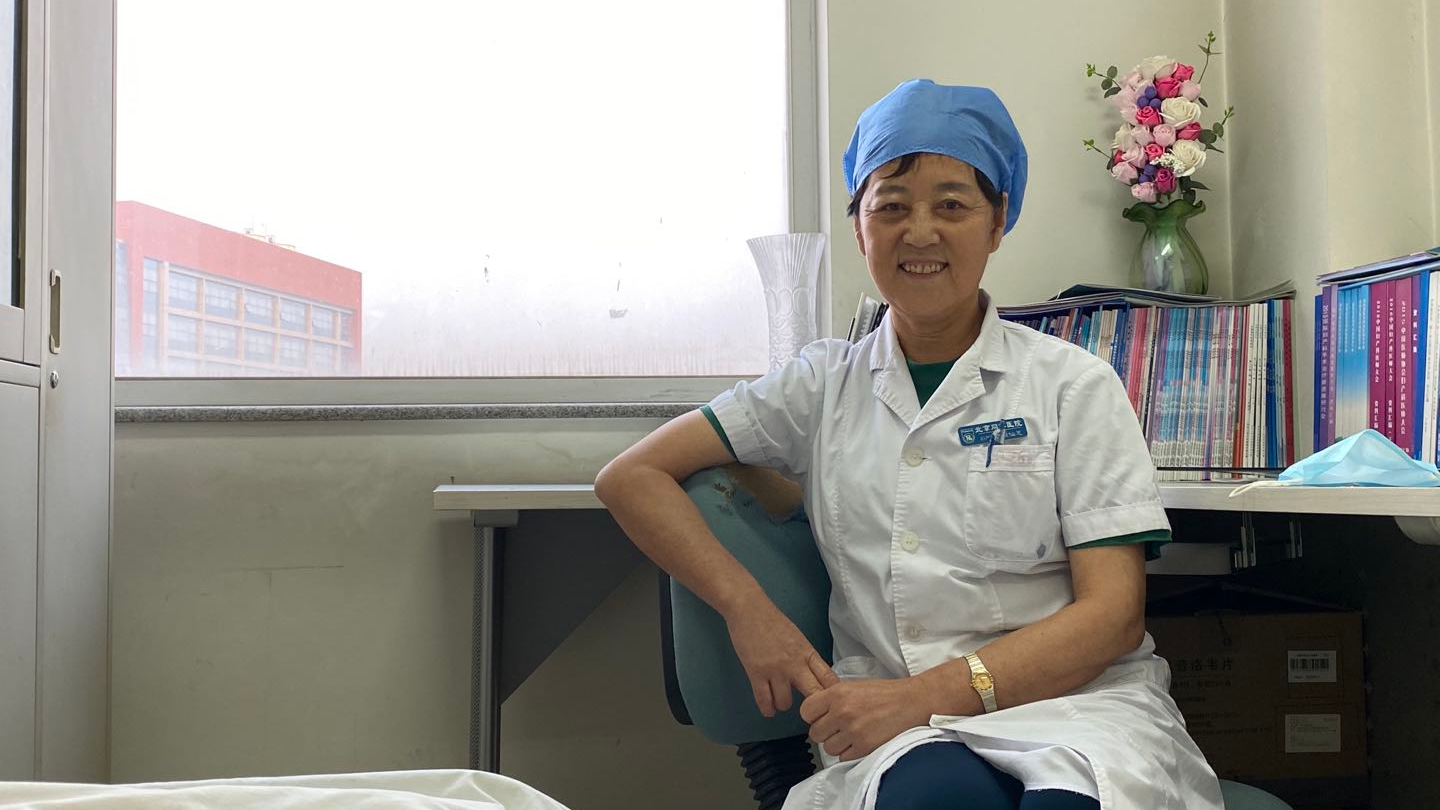
Duan Xianzhi in her office at Tongren Hospital in Beijing, China, September 30, 2021. Wang Xiaonan/CGTN
Duan Xianzhi in her office at Tongren Hospital in Beijing, China, September 30, 2021. Wang Xiaonan/CGTN
"When I was little, I often heard elderly neighbors murmuring that someone was having postmenopausal bleeding. And people died from it," she recalled. She did not learn that it was actually cervical cancer and that it's primarily caused by infection from the human papillomavirus (HPV) until she became a medical student many years later. She also found that most women in Inner Mongolia would put up with problems regarding the cervix because gynecological diseases were usually associated with promiscuity or other activities that were stigmatized.
The shame attached to the disease prevented them from seeing a doctor, let alone get screened. Duan went from door to door, persuading the women to get tested. "Penury is one thing; the feeling of shame or fear due to poor information is another."
Duan and her team have screened 120,000 women over the years, and according to their findings, Ordos had the highest detection rate for cervical cancer, standing at 9.87 percent. "That means one in every 10 women with positive HPV test results in Ordos is likely to develop cervical cancer."

The only health center in Shi'erliancheng Village, Jungar Banner under Ordos City, north China's Inner Mongolia Autonomous Region, September 4, 2021. Yang Shengjie/CGTN
The only health center in Shi'erliancheng Village, Jungar Banner under Ordos City, north China's Inner Mongolia Autonomous Region, September 4, 2021. Yang Shengjie/CGTN
The 'silent killer'
Cervical cancer is the fourth most common cancer in women worldwide. It kills more than 300,000 women per year, with one woman diagnosed every minute and dying of the disease every two minutes.
It's called the "silent killer" because it typically presents no symptoms in its early stages and develops slowly. Without regular screening and timely treatment, cervical cancer, in most cases, can't be identified until it's too late.
The disease is even deadlier for women in the developing world. Some 80-90 percent of those who die from cervical cancer are from middle- and low-income countries, according to the World Health Organization (WHO). Lack of access to prevention and treatment means, including screening, surgery, chemotherapy or radiotherapy, have resulted in alarming death rates.
The situation is equally grave in China. Among the more than 340,000 deaths from cervical cancer in 2020 worldwide, nearly 60,000 were in China. The incidence and death rates vary widely among regions. The annual mortality rate in rural China is twice as high as among urban women, as shown by cervical cancer studies.
Remote, desolate rural regions such as Inner Mongolia report the most disturbing figures. In the 1990s, cervical cancer mortality in Inner Mongolia was 7.6 per 100,000 people, which remained distressing despite a decline from 14.4 in the 1970s, according to estimates. Morbidity also posts a concerning annual growth rate of over 25 percent in the region, twice as high as the national average.
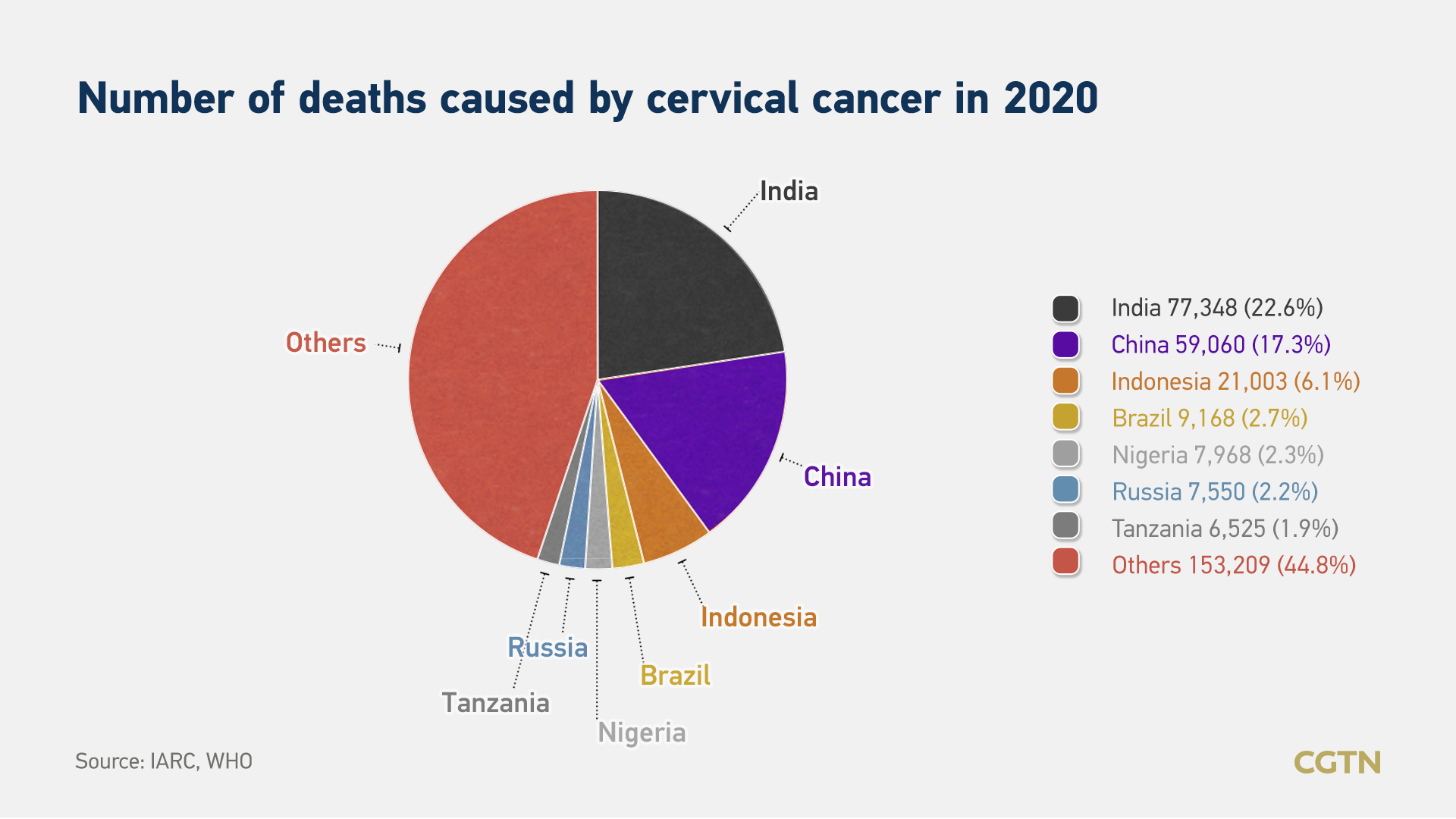
However, the threat to women's lives is preventable and even curable if detected early.
Out of all types of human cancers, cervical cancer is the only one with a known cause – infection with certain high-risk types of HPV. The virus is primarily transmitted through sexual activity. After transmission, it depends on the person – for those who are fortunate or have strong immune systems, the virus is purged from their bodies. A weakened immune system could give HPV the chance to integrate with the DNA in the cells, to which the virus could then cause changes that may eventually give rise to cervical cancer.
It's the only curable cancer in human history. Screening and getting an early diagnosis are crucial to preventing infections and precancers. These measures can make a real difference – a difference between life and death.
"Women should not be dying from cervical cancer," Duan said. "Especially now that we have vaccines in addition to screening."
HPV vaccination is the primary prevention of infection. The first HPV vaccine became available in 2006, and a decade later, it entered China. By the end of 2019, the first domestic HPV vaccine was introduced after rigorous review over the course of 18 years.
The World Health Organization (WHO) launched the Global Strategy to Accelerate the Elimination of Cervical Cancer last November, proposing 90-70-90 targets by 2030 – that is, 90 percent of girls fully vaccinated with the HPV vaccine by 15 years of age, 70 percent of women screened using a high-performance test by age 35 and again by 45, and 90 percent of women identified with cervical disease receiving treatment. The initiative points out that vaccination, screening and treatment, if properly implemented, could reduce more than 40 percent of new cases and 5 million related deaths by 2050. It was the first time that 194 countries committed to a goal, marking a historic collective effort in tackling the disease.
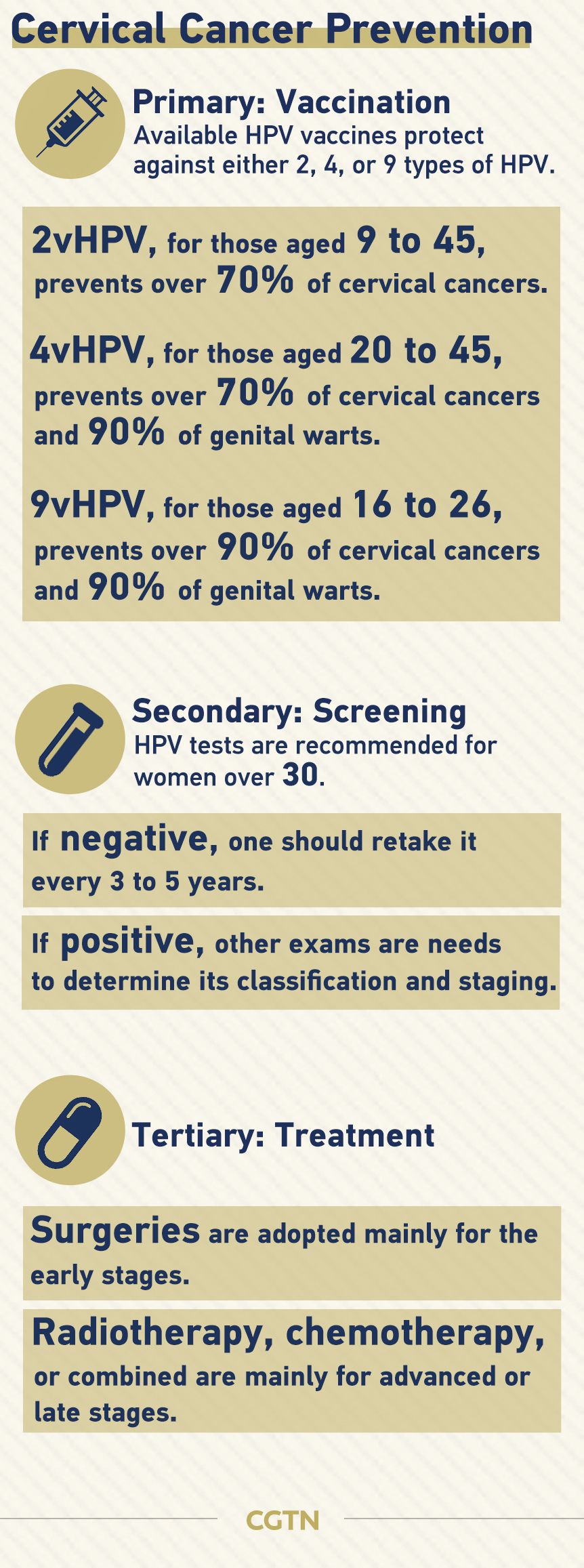
Make it happen
We arrived in Jungar on a breezy September day, in the middle of Duan's trip as part of the cervical cancer prevention and treatment program. Since her transfer to Beijing Tongren Hospital in 2008, she's been making such trips once or twice a month, carrying out screenings during the summer months and performing operations on those diagnosed with precancerous lesions or cancers during the previous year's screenings. Last year, she spent 128 days working here.
Though perched on what's known as tourist idylls, Jungar, quietly lying along the Yellow River, possesses no beautiful grasslands and pastures. "This is my hometown. I want to do something for the women here – the mothers and the daughters who have lived on this land for generations."
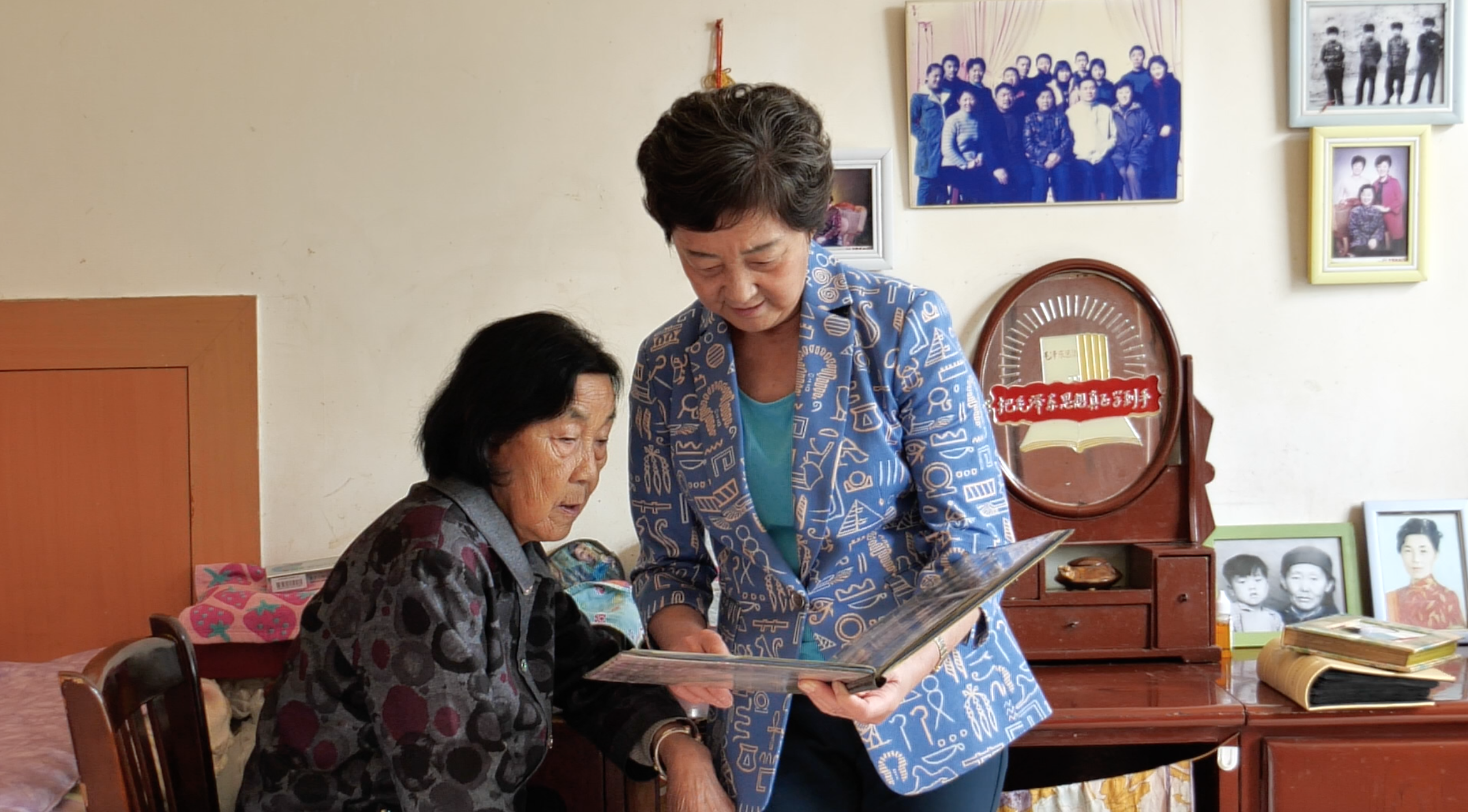
Duan Xianzhi and her mother, who is around 90 years old, browse old family pictures in Duan's family home in Shi'erliancheng Village, Jungar Banner, Ordos City, Inner Mongolia, September 5, 2021. Du Junzhi/CGTN
Duan Xianzhi and her mother, who is around 90 years old, browse old family pictures in Duan's family home in Shi'erliancheng Village, Jungar Banner, Ordos City, Inner Mongolia, September 5, 2021. Du Junzhi/CGTN
In the public health center of Shi'erliancheng Village under Jungar, the only hospital in the village, we saw women gathering in the hallways in clusters, waiting to get screened. "I heard Dr Duan came back to do the screenings in person, so I brought my mother here, and we can both get checked together," a young woman said excitedly. Like her, a lot of women came from hundreds of miles away with their mothers or mothers-in-law. Nowadays, over 84 percent of female residents would accept cervical screenings, something unimaginable just a few years ago.
For the past week, Duan screened some 200 women every day. After finishing this screening round, she rushed to another hospital in a local economic development zone to perform surgeries for a dozen women diagnosed with different kinds of precancers or invasive cancers.
Guo Yanfang, 36, arrived at the hospital late in the night after a five-hour coach trip. "I heard Dr Duan would be here today, so I came immediately," she said, fidgeting. She was diagnosed with three precancerous lesions and couldn't wait to get the operation. After a day of 11 operations, Duan decided to stay in town for another day to accommodate this anxious woman.
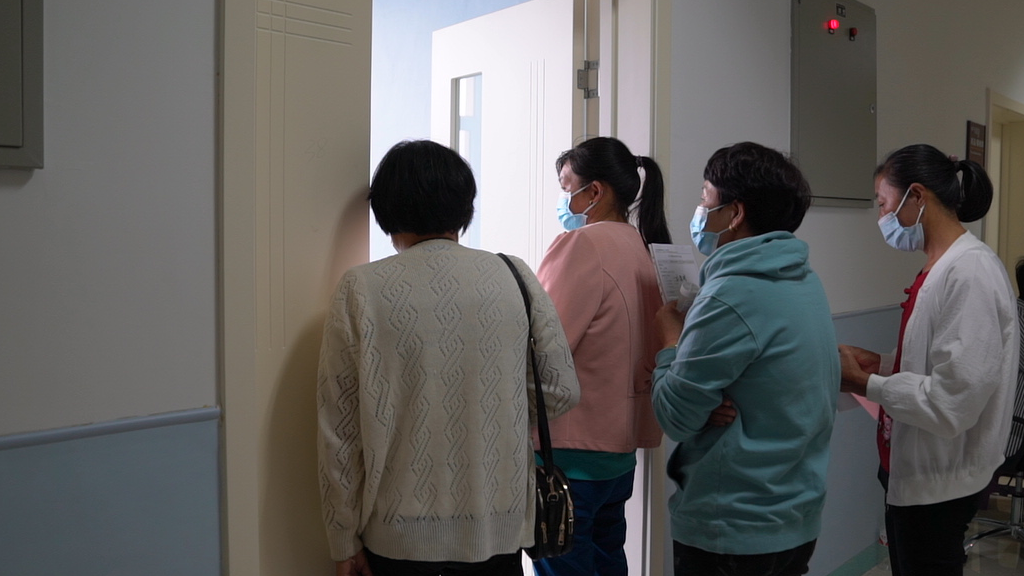
Women queue at the door of the screening room in the health center of Shi'erliancheng Village, Jungar Banner under Ordos City, Inner Mongolia, September 4, 2021. Du Junzhi/CGTN
Women queue at the door of the screening room in the health center of Shi'erliancheng Village, Jungar Banner under Ordos City, Inner Mongolia, September 4, 2021. Du Junzhi/CGTN
Besides pioneering free cervical screenings, Jungar shot to fame in August 2020 with the initiative to offer free HPV vaccination for girls aged 13-18.
"I remember when Ordos became the first Chinese city to offer free HPV vaccination last summer, it became one of the top trending Weibo searches," Lu Jia recalled. She was one of the girls that were receiving their third shots of HPV vaccine at the banner's women and children's hospital on the day we went. "I'm very proud of my hometown," said the 17-year-old girl. Entering the final year of senior high, she hopes to study at a medical school and become a cardiologist. "I want to save people's lives, just as now we can get vaccinated against HPV."
Once the vaccine hit the shores of China, the demand far exceeded the supply despite high costs, with many girls even going to Hong Kong to get it. Eventually, big cities on the Chinese mainland had ample supply, but one may have to wait several months to get the vaccine at public hospitals.
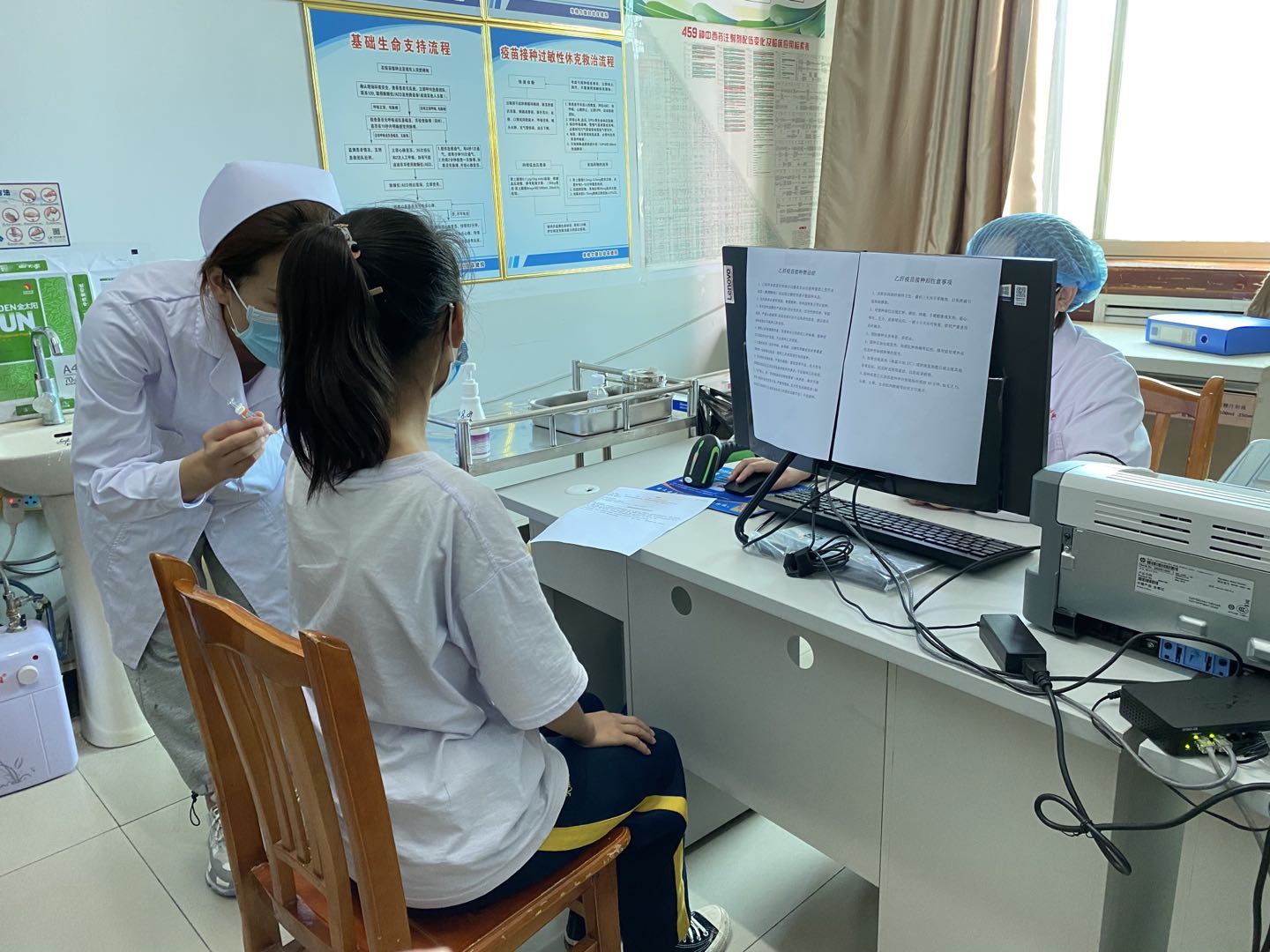
Lu Jia, a local senior high student, receives her third shot of the HPV vaccine at the Jungar Banner Women and Children's Hospital, Ordos City, Inner Mongolia, September 6, 2021. Wang Xiaonan/CGTN
Lu Jia, a local senior high student, receives her third shot of the HPV vaccine at the Jungar Banner Women and Children's Hospital, Ordos City, Inner Mongolia, September 6, 2021. Wang Xiaonan/CGTN
"It seems like a miracle that such a rare luxury could happen in this backward, scarcely populated township," the head nurse said. This miracle wouldn't have happened without Duan and her colleague Qiao Youlin, a cancer epidemiologist at Peking Union Medical College.
In the '90s, Qiao gave up a desired research post at John Hopkins and returned to Beijing to start from scratch in China's cervical cancer prevention and treatment. After launching screenings in an impoverished county in northern Shanxi Province, he went on to look for other rural areas to continue the work, which was difficult because he had few connections with local hospitals.
On the other side, upon hearing that Qiao had a more accurate and cost-effective testing method, Duan rushed to visit him. The two doctors, both compassionate workaholics, hit it off – they started to launch massive screenings with the new method in Jungar. Things fell into place rapidly. As people became more accepting of cervical screenings, it was easy to carry out free HPV vaccination. "For the first month, the vaccination rate achieved 84.5 percent," Qiao said, looking radiant.
Though 65, he's still leading the campaign to eliminate cervical cancer in a multitude of Chinese cities. "Besides using your expertise, you have to ensure women book their screening tests (once every five years), and then you need to get more girls to receive vaccines," he noted.
He once lamented that China is a latecomer to HPV vaccination but now is happy to see the progress, "We're quickly catching up." The local government was very supportive of this endeavor when no other city in China had ever tried. Zhang Yinyin, deputy county head of Jungar, pledged 4.8 million yuan ($750,000) for the vaccination project, despite the risk of being the first mover. "She's a young ethnic Mongolian. She knew the pain of the women on the plateau."
As of September 2021, Jungar has given the first shots of HPV vaccination to some 85 percent of girls aged 13-18. "As such, we'll complete the WHO's 2030 goal by 2023," said Duan, smiling proudly.

Girls pose for a photo after getting HPV vaccines at Jungar Banner, Ordos City, Inner Mongolia, in the summer of 2020. /courtesy of Duan Xianzhi
Girls pose for a photo after getting HPV vaccines at Jungar Banner, Ordos City, Inner Mongolia, in the summer of 2020. /courtesy of Duan Xianzhi
A difficult childhood
As a little girl, Duan craved knowledge. But half a century ago, few girls in rural China had access to education. "From the second grade in elementary school, I was the only girl in class. My mother and grandma used to object to me going to school. So when I came back from school, I just hid my bag in a stack of firewood outside my home and my dog looked after it every night. The next morning I told my mother I needed to use the toilet [At the time, toilets were built outside the house in villages] and ran to take my bag and headed to school," Duan described for us. She ran a dozen kilometers every day, practiced calligraphy in the soil, and sold eggs to buy books.
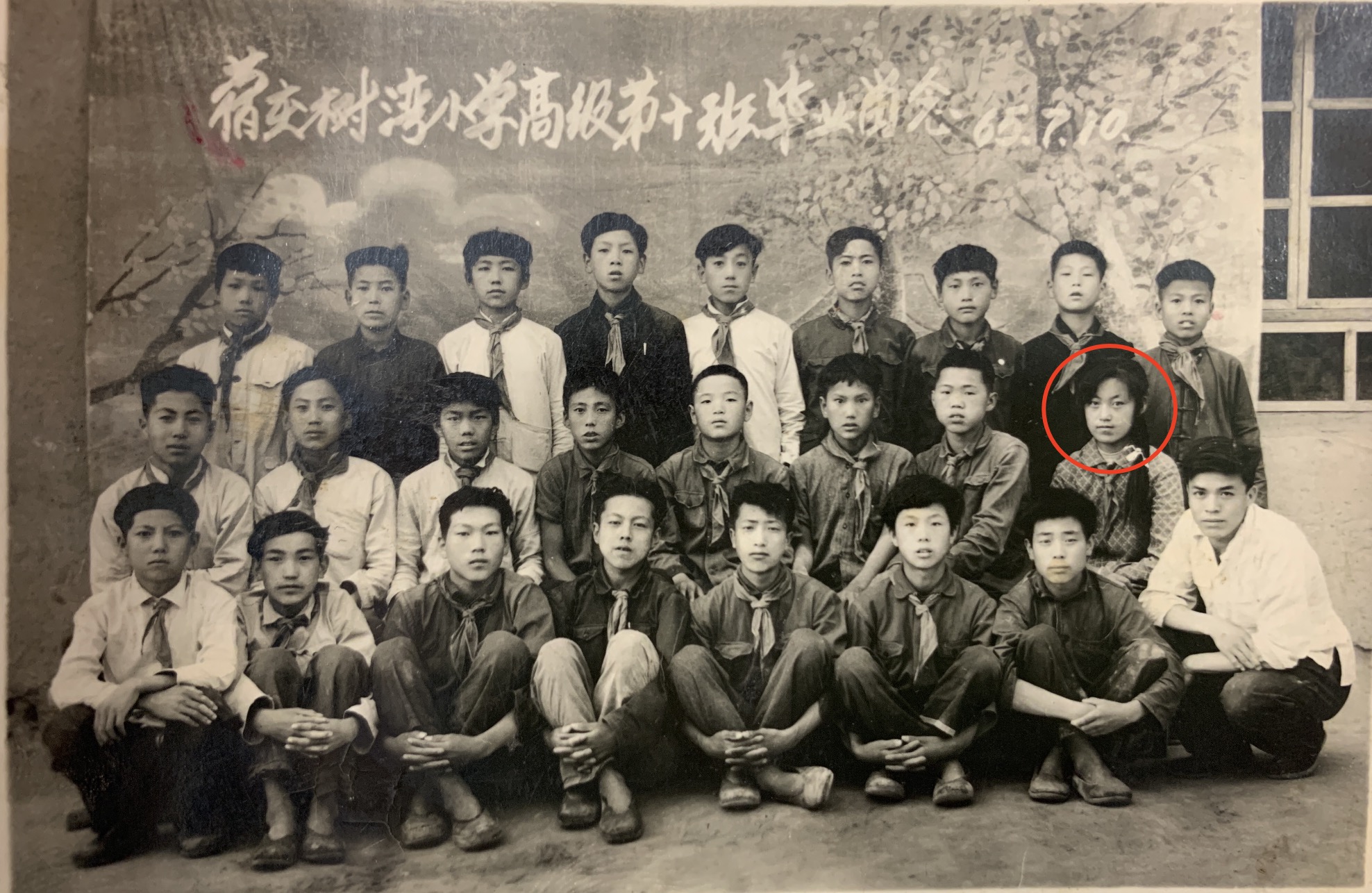
Duan Xianzhi (1st L, 2nd row) was the only girl in her class from second grade in elementary school. /courtesy of Duan Xianzhi
Duan Xianzhi (1st L, 2nd row) was the only girl in her class from second grade in elementary school. /courtesy of Duan Xianzhi
Her efforts paid off. In 1965, she became the only student in her village to be admitted to Jungar's sole middle school. Her graduation from high school coincided with the pandemonium of the Cultural Revolution. Like millions of youths in the country, she couldn't take the entrance exams to enter university, but she didn't want to return home either to toil the land. With a childhood dream of being a doctor, she chose to do simple jobs for the banner's health center such as planting vegetables. "When I was six, I saw a family relative die of tuberculosis. I was determined to become a doctor so that I could save people's lives."
The hospital recognized her diligence and determination, so it trained her to become a nurse and then gave her a quota to study at the Inner Mongolia Medical University. She chose to be an obstetrician-gynecologist at the Jungar Banner Hospital upon graduation as the hospital had no trained doctor in this arena. Given her childhood experience, Duan has a keen understanding of the plight facing women residing in rural China.
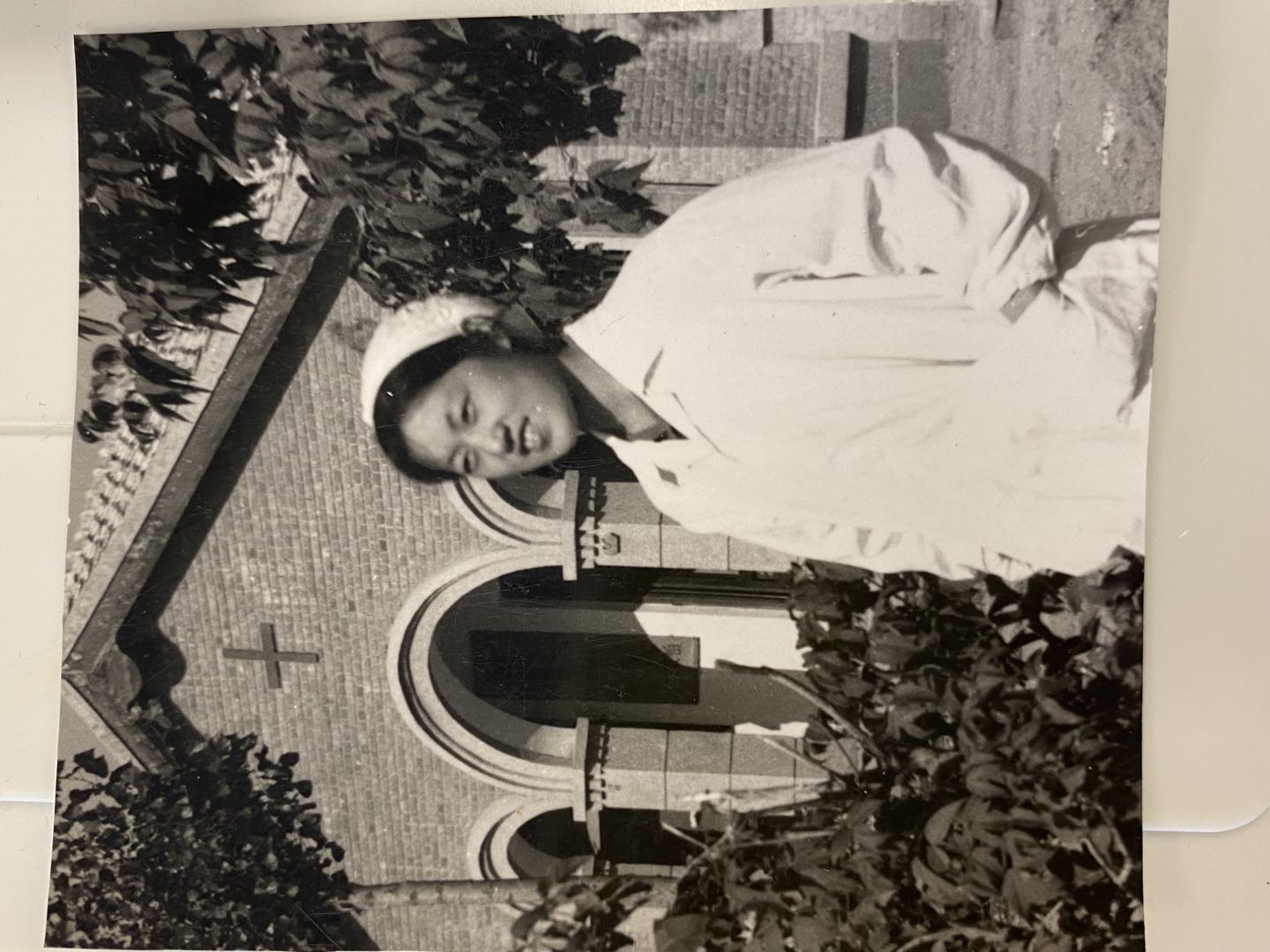
Duan Xianzhi works as a doctor at the only health center in Jungar Banner, Ordos City, Inner Mongolia, in her 20s. /courtesy of Duan Xianzhi
Duan Xianzhi works as a doctor at the only health center in Jungar Banner, Ordos City, Inner Mongolia, in her 20s. /courtesy of Duan Xianzhi
At a training program in Hohhot, capital of Inner Mongolia, in 1985, she found many rural women diagnosed with cervical cancer were too poor to get any treatment. "I felt sorry for them, but my teacher Wang Enyu said, 'Feeling sorry changes nothing. You need to hone your skills. Only when you become a good surgeon can you serve these women from your hometown."
Duan is undoubtedly very accomplished and passionate about her mission, but her dedication has not been without sacrifices. Her time devoted to helping women and girls across Inner Mongolia made her miss out on much of her children's lives.

Duan Xianzhi (6th L) and Qiao Youlin (7th L) at the 2021 APEC Women Leadership Forum in Chengdu, southwest China's Sichuan Province, September 25, 2021. /courtesy of Qiao Youlin
Duan Xianzhi (6th L) and Qiao Youlin (7th L) at the 2021 APEC Women Leadership Forum in Chengdu, southwest China's Sichuan Province, September 25, 2021. /courtesy of Qiao Youlin
"There's always a limit in one's time and energy. For a certain period of time when I was on the night shift doing operations, I had to ask the patient's family members to look after my kids," she recalled.
Over the past more than 40 years, she treated over 500,000 women and did more than 20,000 operations.
As she keeps dedicating her life to helping the women and girls of her native region stay away from cervical cancer, she continues to raise awareness while being self-effacing, preferring instead to bring attention to the many people she's treated, their families, and those who continue to be shackled by the stigma of a culture she knows deeply. One day, she hopes to see her hometown and beyond free of the plight of cervical cancer.
(Du Junzhi also contributed reporting).
Writer: Wang Xiaonan
Video director: Yang Shengjie
Video editors: Yang Yiren, Yang Shengjie
Voiceover: Zhao Yue
Infographics: Du Junzhi, Feng Yuan, Zhu Shangfan
Cover image designer: Liu Shaozhen
Producer: Wang Xiaonan
Supervisor: Zhang Shilei

